De Afghaanse schrijver Khaled Hosseini werd geboren op 4 maart 1965 in Kabul. Zie ook alle tags voor Khaled Hosseini op dit blog.
Uit: En uit de bergen kwam de echo (Vertaald door W. Hansen)
“Najaar 1952
Vader had Abdullah nooit eerder geslagen. Dus toen hij het wel deed, toen hij de zijkant van Abdullahs hoofd raakte, vlak boven het oor, hard en onverhoeds en met de vlakke hand, sprongen er tranen van verbazing in Abdullahs ogen.
Hij knipperde ze snel weg.
‘Naar huis,’ zei vader knarsetandend.
Abdullah hoorde boven zich Pari in snikken uitbarsten.
Toen sloeg vader hem opnieuw, harder, ditmaal op zijn linkerwang. Abdullahs hoofd kantelde opzij. Zijn gezicht schroeide, en er kwamen meer tranen. Zijn linkeroor suisde. Vader bukte zich zo ver voorover dat zijn donkere, gerimpelde gezicht de woestijn en de bergen en de lucht helemaal verduisterde.
‘Ik zei je dat je naar huis moest gaan, jongen,’ zei hij met een gepijnigde blik.
Abdullah gaf geen kik. Hij slikte luid en gluurde naar zijn vader, terwijl hij met zijn ogen knipperde achter de hand die de zon afschermde.
Vanaf de kleine, rode kar gilde Pari zijn naam, terwijl ze beefde van angst. ‘Abollah!’
Vader hield hem met een strenge blik op afstand en sjokte terug naar de kar. Op de bodem ervan strekte Pari haar handen uit naar Abdullah. Abdullah gaf hun een voorsprong.
Toen veegde hij zijn ogen af met de muis van zijn hand en volgde hen.
Even later gooide vader een steen naar hem, zoals kinderen in Shadbagh stenen gooiden naar Shuja, de hond van Pari – zij het dat de kinderen Shuja wilden raken om hem pijn te doen. De steen van vader kwam een meter van Abdullah op de grond terecht, machteloos. Hij wachtte, en toen vader en Pari zich weer in beweging zetten, ging Abdullah opnieuw achter hen aan.”
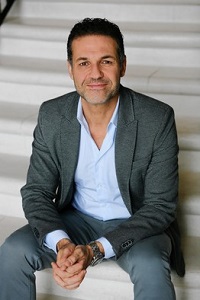
Khaled Hosseini (Kabul, 4 maart 1965)
De Oostenrijkse dichter en schrijver Robert Kleindienst werd geboren op 4 maart 1975 in Salzburg. Zie ook alle tags voor Robert Kleindienst op dit blog.
verwegene männer am wegrand
wer sagt es
(um: wie deplaziert
am rand zu stehn,
mit aufgerissenem gesicht,
blutmondaugen,
nein, nicht zu sprechen vom
hals im luftschaft,
davon, wiederum, hielten
nur wenige mehr)
wer,
wer sagt es
im moment liegt vergangenes näher
dieser punkt der
erhofft und erwartet
pikiert von der unmenge nebensächlichkeiten
zweifelhaftes liedgut
unsingbar
wie zuvor gleich
einer parabel an nebensächlichkeiten
gleich
dem so nicht sagbaren nichts
unsingbares andeutungsweise
um verstehen zu geben
es wäre doch: mehr
des gesagten mehr
eines untrennbar mit dem autor
verbundenen gefühl des staunens
der verachtung
der geringfügigen hochschätzung und
doch passiert nichts
wiederholt:
nichts: hier
hier
beim soeben erdachten
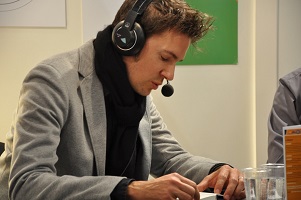
Robert Kleindienst (Salzburg, 4 maart 1975)
De Duitse schrijver Kristof Magnusson werd geboren op 4 maart 1976 in Hamburg. Zie ook alle tags voor Kristof Magnusson op dit blog.
Uit: Summer of Love (Vertaald door Mike Mitchell)
“I was told there was no supermarket there and was sent instead to Bolinas People’s Store.
There I had just put a bottle of Calistoga Water and some fairtrade Save-the-Rainforest chocolate in my shopping basket when my attention was caught by a woman at the back of the shop who was absentmindedly twirling a stand with indigo jeans. When she noticed me looking at her she seemed to wake from a trance, let go of the stand and walked past me to the bread shelf. Sunglasses pushed back on her forehead kept her shoulder-length hair from falling over her face.
She picked up one of the loaves with pumpkin seeds, weighed it in her hand a few times, squeezed it, stuck her thumb and forefinger in, tore off a piece and tasted it. Then she put the loaf back, took the one behind it and tested that one too. She settled on the second loaf and went to pay at the till. Now she concentrated on her money, looking at every note as if she were wondering which one she could best be parted from. I remembered that in America one-dollar bills were called singles, but she had paid and left before I’d managed to make a pun on it.
I followed her out. She pulled her sunglasses down and chucked the loaf through the open window of her Volkswagen New Beetle. Then she leant against the mudguard. I looked at her. And she looked in my direction, though because of the sunglasses it was difficult to say whether she was really looking at me. Once I thought I could feel her eyes on me and tried a smile, but there was no response. However, she didn’t look away either.”
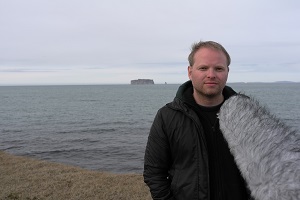
Kristof Magnusson (Hamburg, 4 maart 1976)
De Russische dichteres en dissidente Irina Ratushinskaya werd geboren op 4 maart 1954 in Odessa. Zie ook alle tags voor Irina Ratushinskaya op dit blog.
Some people’s dreams pay all their bills
Some people’s dreams pay all their bills,
While others’ gild an empty shell..
But mine go whimpering about a velvet dress,
Cherry-red and sumptuous as sin.
O, inaccessible! Not of our world!
Nowhere to get you, or to put you on…
But how I want you!
Against all reason’s reproaches –
There, in the very narows of the heart’s
Recesses – flourishes the poison
Of heavy folds, and obscure embroidery…
The childish, flouted right
To beauty! Not bread, not domicile –
But unbleached, royal lace,
Enspiralled rings, sly ribbons – but no!
My day is like a donkey, bridled, laden,
My night deserted, like the prison light.
But in my soul – it’s no good! I am guilty! –
I keep on sewing it, and in my mind I make
The thousandth stitch, as I do up my anorak
And try on my tarpaulin boots.
No, I.m not afraid
No, I’m not afraid: after a year
Of breathing these prison nights
I will suryive into the sadness
To name which is escape.
The cockerel will weep freedom for me
And here – knee-deep in mire –
My gardens shed their water
And the northem air blows in draughts.
And how am I to cary to an alien planet
What are almost tears, as though towards home..
It isn’t true, I am afraid, my darling!
But make it look as though you haven’t noticed.
Vertaald door David McDuff
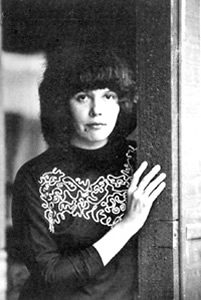
Irina Ratushinskaya (Odessa, 4 maart 1954)
De Engelse schrijver Alan Sillitoe werd geboren op 4 maart 1928 in Nottingham. Zie ook alle tags voor Alan Sillitoe op dit blog.
Uit: The Loneliness of the Long-Distance Runner
“If the In-laws are hoping to stop me making false moves they’re wasting their time. They might as well stand me up against a wall and let fly with a dozen rifles. That’s the only way they’ll stop me, and a few million others. Because I’ve been doing a lot of thinking since coming here. They can spy on us all day to see if we’re pulling our puddings and if we’re working good or doing our 4 athletics’ but they can’t make an X-ray of our guts to find out what we’re telling ourselves. I’ve been asking myself all sorts of questions, and thinking about my life up to now. And I like doing all this. It’s a treat. It passes the time away and don’t make Borstal seem half so bad as the boys in our street used to say it was. And this long-distance running lark is ’the best of all, because it makes me think so good that I learn things even better than when I’m on my bed at night. And apart from that, what with thinking so much while I’m running I’m getting to be one of the best runners in the Borstal. I can go my five miles round better than anybody else I know.
So as soon as I tell myself I’m the :first man ever to be dropped into the world, and as soon as I take that first flying leap out into the frosty grass of an early morning when even birds haven’t the heart to whistle, I get to thinking, and that’s what I like. I go my rounds in a dream, turning at lane or footpath corners without knowing I’m turning, leaping brooks without knowing they’re there, and shouting good morning to the early cow-milker without seeing him.”
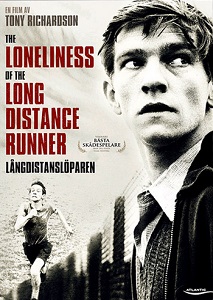
Alan Sillitoe (4 maart 1928 – 25 april 2010)
Cover
De Poolse schrijver dichter en journalist Ryszard Kapuściński werd geboren in Pinsk, Polen (thans Wit-Rusland), op 4 maart 1932. Zie ook alle tags voor Ryszard Kapuściński op dit blog.
Uit: The Shadow of the Sun (Vertaald door Klara Glowczewska)
“The street is a roadway delineated on both sides by an open sewer. There are no sidewalks. Cars mingle with the crowds. Everything moves in concert—pedestrians, automobiles, bicycles, carts, cows, and goats. On the sides, beyond the sewer, along the entire length of the street, domestic scenes unfold. Women are pounding manioc, baking taro bulbs over the coals, cooking dishes of one sort or another, hawking chewing gum, crackers, and aspirin, washing and drying laundry. Right out in the open, as if a decree had been issued commanding everyone to leave his home at 8 a.m. and remain in the street. In reality, there is another reason: apartments are small, cramped, stuffy. There is no ventilation, the atmosphere inside is heavy, the smells stale, there is no air to breathe. Besides, spending the day in the street enables one to participate in social life. The women talk nonstop, yell, gesticulate, laugh. Standing over a pot or a washbasin, they have an excellent vantage point. They can see their neighbors, passersby, the entire street; they can listen in on quarrels and gossip, observe accidents. All day long they are among others, in motion, and in the fresh air.
A red Ford with a speaker mounted on its roof passes through the streets. A hoarse, penetrating voice invites people to attend a meeting. The main attraction will be Kwame Nkrumah—Osagyefo, the prime minister, the leader of Ghana, of Africa, of all downtrodden peoples.There are photographs of Nkrumah everywhere—in the newspapers (every day), on posters, on flags, on ankle-length percale skirts. The energetic face of a middle-aged man, either smiling or serious, at an angle meant to suggest that he is contemplating the future.”
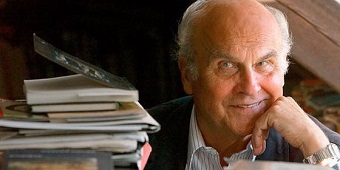
Ryszard Kapuściński (4 maart 1932 – 23 januari 2007)
Zie voor nog meer schrijvers van de 4e maart ook mijn twee blogs van 4 maart 2012.
